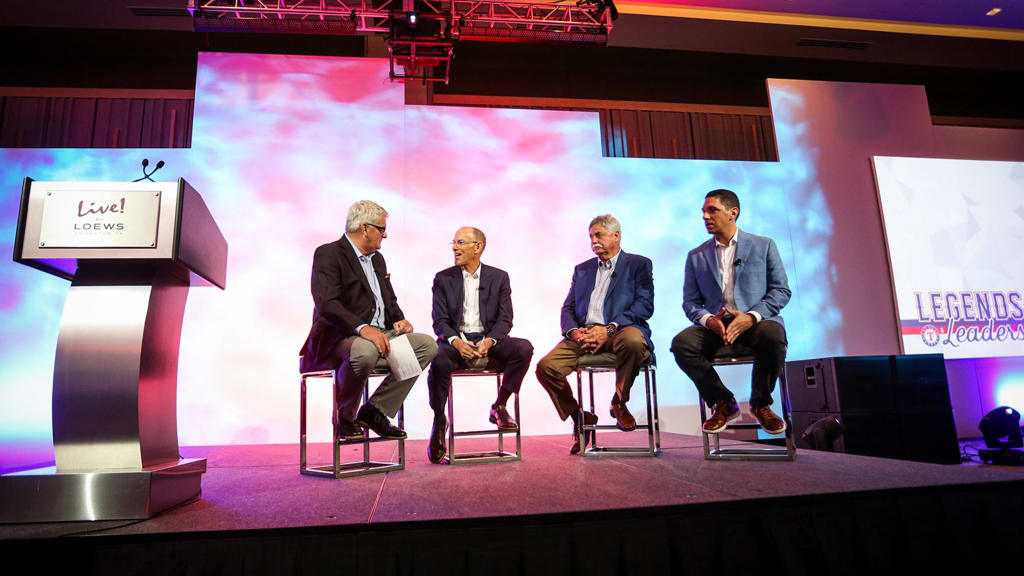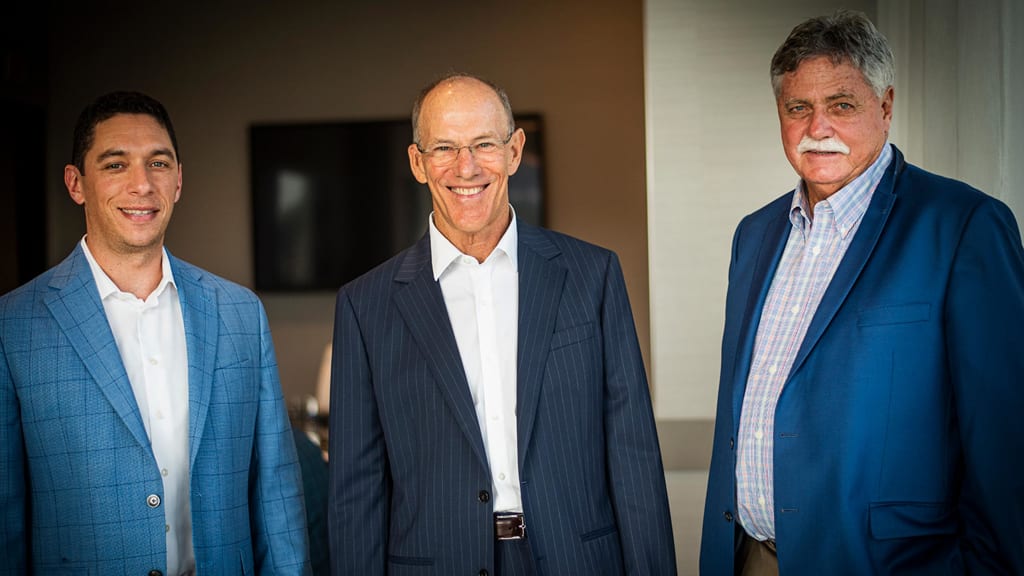
ARLINGTON -- In a conference room in a brand-new hotel, surrounded by picture windows overlooking the construction of Globe Life Field, the chief architects of the Rangers' franchise swapped stories and wisdom Thursday night.
Rangers general manager Jon Daniels (2005-present) and his two most prominent predecessors, Tom Grieve (1984-1994) and Doug Melvin (1994-2001), served in their roles for 32 years combined, running the club for the majority of the team's existence. They teamed up for a roundtable discussion at the opening of the new Live! by Loews hotel, and participated in a lengthy interview session beforehand to discuss wide-ranging topics.
On the way the game has changed, with more home runs, strikeouts and walks -- the so-called "true outcomes" -- than in years past:
Daniels: "Most of the information with the real advantages and the analytics is on the development side and most of it is to help the pitchers. Not all of it, but most of it is to help the pitchers understand what they do. Most guys didn't know about spin rate, and we'd talk about how he has that extra 'hop' at the plate, but now you know why. So these guys can now train for that and they're all throwing 95, 97 [mph]. Used to be everybody was told to get the ball down in the zone. Well, certain guys, you want to get the ball up. That's all of these advantages that are for the pitchers. I think it's starting to turn a little bit, more and more for the hitters, but it's still not an even footing."
Grieve: "Everybody you bring into the game throws 100 mph, so I think it's a combination -- like a perfect storm. It seems like that's what the analytics show to win games. For years and years when the hitters were dominating the game you heard, 'There's just no pitching anymore.' But that wasn't true. The pitching was good, the hitters were just a little bit ahead of them. Now the velocity is up, every guy in the bullpen throws 98 mph. I think it's a combination of the pitching and the overall philosophy."
Melvin: "I'd like to see starting pitchers go deeper in games. I think that has something to do with the length of games. … This is old school, but I stay in touch with Fergie Jenkins. He had a lot of complete games and I asked him how many pitches he threw in a complete game, and he said he never knew. He said the job was to pitch nine innings to win the game. Pitches did not matter back then."
On how front-office organizations have changed over the years and how to balance traditional scouting departments and modern analytics:
Daniels: "Doug and I were talking about the idea of making decisions all off a statistical model, which every club has -- some clubs are probably better at it than others -- but I always feel like you're working off most of the same information. Not all of it, some people have different stuff. But for the most part, it's going to bring you back to the pack, bring you back to the mean. You're looking for edges. You don't want to be on the bell curve. You end up making the safe play all the time on the bell curve, you end up right in the middle, you win 81 games. You have to take some chances."
Grieve: "In 1985, we had six people in baseball operations. Six. And the funny thing is, one of them was a sabermetrician. [Owner] Eddie Robinson hired Craig Wright in 1981. And as far as I know, he was the first analytics person, sabermetrician, hired by a Major League team. You can't be more old-school than Eddie Robinson, and he hired Craig Wright. He went on to be one of the founders of STATS, Inc."
Melvin: "You've just got to hire good people, trust them, give them the latitude to do their jobs and then hold them accountable and be there if they need help."

On the stress level of being a GM, and how technology has affected that:
Grieve: "Jon's job is way tougher than mine. I had six people that worked for me and he hired 50 this winter. You don't realize it when you're doing it, but it consumes every second of every day. If you're not doing something, you're thinking about it. You're on vacation, you're thinking about it. But the other thing was, back then, for 10 years, I never had a cell phone."
Melvin: "As soon as [Daniels] goes to a nice dinner with his wife and kids, that [phone], he can't help but look at that."
Daniels: "Some of the guys have the Apple Watch. I refuse to get it because I don't want to have another reminder buzzing on my arm."
Melvin: "I remember I used to have a little thing from ESPN. It showed the score and it showed a little guy running around the bases. I used to sit there at the table and it would go, 'Beep, diddle-diddle-diddle, two runs scored.' That's all we had back then."
On whether it's easier to sign free agents with a new ballpark on the way -- as Grieve did after The Ballpark in Arlington (now Globe Life Park) was announced, and as Daniels has now with Globe Life Field under construction next door:
Daniels: "I don't think the ballpark sways it dramatically. I think it could be a tiebreaker or something like that. … Somebody who's getting a big-market deal, I don't think it matters a ton, personally."
Melvin: "To some effect, it's whether it's a hitter's or pitcher's park. … I think that has an effect on a one- or two-year deal, but when it comes down to a long-term deal, the money makes the difference. The extra year, always. How many times have you been told, 'Well, I've got a three-year deal, whoever comes up with a fourth?' You're sitting there, 'Well, the fourth year is a wasted year. Hope I can trade him then.'"
Grieve: "I noticed what general managers have noticed for 100 years: If you put the right contract in front of them, they'll come to your ballpark."
On how teams decide what to do with retractable roofs (Melvin was GM in Milwaukee in Miller Park's early years) and what the Rangers will do next year:
Daniels: "Different variables. … Open or closed, what's the temperature, day/night. … What we want to do is find a balance between best for us as a team and also good for the fans, but I think MLB's going to require us to give some guidelines. We could change them year to year, but you just can't change them game to game. They don't want it to be like, we've got a fly-ball guy tonight, let's close the roof, or we've got a ground-ball guy, let's open it up, or open it in the middle of an inning."
"We'd rather play open-air, but I remember in 2011 we had 40-something straight days of 100 degrees, and at 7 o'clock at night it was 97 degrees. … We're going to use common sense."
Melvin: "What we ran into [in Milwaukee] is some of the players wanted it closed all the time. … We knew they wanted it closed, because the ball carried more when it was closed. So our manager would call up and say, "Hey, Doug, it's a little cooler down here than you think.' And our business guy would run in here and say, 'What have we got the roof closed for?' The fans did want it [open], but Milwauke's weather [is] different than here. They'd have the roof open 45 degrees up there and fans were OK with it. Down here, I understand, the heat."
Daniels: "Anybody that wasn't sure about wanting a roof -- after the doubleheader we had the other day [against the Angels on Tuesday]? One-hundred-eight degree heat index. Brutal."
On their favorite memories of Globe Life Park:
Melvin: "Going to the playoffs for the first time in [the then-25-year franchise history] in 1996 was exciting. I remember Juan Gonzalez getting 100 RBIs before the All-Star break on the last game against Randy Johnson in 1998.
"Having the opportunity to watch Pudge [Ivan Rodriguez] play day in and day out, throwing runners out. I heard this story that a runner at first base told [Rafael] Palmeiro, 'I'm not going to get off too far because that little catcher is going to pick me off,' and just as he said it, he got picked off. Some of the plays he would make! That helped the pitching staff so much, keeping the double plays in order and not allowing runners to get in scoring position."
Grieve: "It's easy to say Kenny Rogers' perfect game [in 1994]. When [Neftali Feliz] struck out [Alex Rodriguez to win the 2010 AL pennant], that's everybody's -- but that's everybody's for a reason. I felt the same way everybody else did, too."


